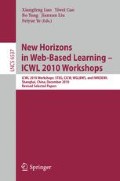Abstract
With the rapid development of the online games, the educational game has been demonstrated as a potential learning tool which can enhance learning motives [1]. Now the educational game represents a new interesting development in the field of education. In this paper, we first introduce the effective learning environment, flow, motivation (EFM) model which is a user-centered game design model, and then design the educational game for teaching Chinese as a foreign language based the EFM model’s idea. This educational game creates engaging and immersive learning experience for delivering learning outcomes, it attempts to provide a new study way and new study experience to the foreigners.
Access this chapter
Tax calculation will be finalised at checkout
Purchases are for personal use only
Preview
Unable to display preview. Download preview PDF.
References
Ke, F.: A qualitative meta-analysis of computer games as learning tools. In: Ferdig, R.E. (ed.) Handbook of Research on Effective Electronic Gaming in Education, vol. 1. Information Science Reference, Hershey (2009)
Song, M., Zhang, S.: EFM: A Model for Educational Game Design. In: Proceedings of the 3rd international Conference on Technologies for E-learning and Digital Enterainment (2008)
Bransford, J., Brown, A., Cocking, R. (eds.): How people learn: Brain, mind, experience, and school, Washington, DC (2000)
Houser, R., Deloach, S.: Learning from Games Seven principles of Effective Design. Technical Communication 45(3), 319–329 (1998)
Csikszenmaihalyi, M.: CREATIVITY.: Flow and the psychology of discovery and invention. Harperennial, New York (1997)
The ARCS model, http://www.e-learningguru.com/articles/art3_5.htm
Paras, B.S., Bizzocchi, J.: Game, Motivation, and Effective Learning: An Integrated Model for Educational Game Design. In: DiGRA 2005 Conference: Changing Views–Worlds in Play (2005)
The Cone of Experience, http://web.utk.edu/~mccay/apdm/selusing/selusing_d.htm
Author information
Authors and Affiliations
Editor information
Editors and Affiliations
Rights and permissions
Copyright information
© 2011 Springer-Verlag Berlin Heidelberg
About this paper
Cite this paper
Zhang, Y., Shan, L., Li, S. (2011). Educational Game Design for Teaching Chinese as a Foreign Language by Effective Learning Environment, Flow, Motivation. In: Luo, X., Cao, Y., Yang, B., Liu, J., Ye, F. (eds) New Horizons in Web-Based Learning - ICWL 2010 Workshops. ICWL 2010. Lecture Notes in Computer Science, vol 6537. Springer, Berlin, Heidelberg. https://doi.org/10.1007/978-3-642-20539-2_1
Download citation
DOI: https://doi.org/10.1007/978-3-642-20539-2_1
Publisher Name: Springer, Berlin, Heidelberg
Print ISBN: 978-3-642-20538-5
Online ISBN: 978-3-642-20539-2
eBook Packages: Computer ScienceComputer Science (R0)

